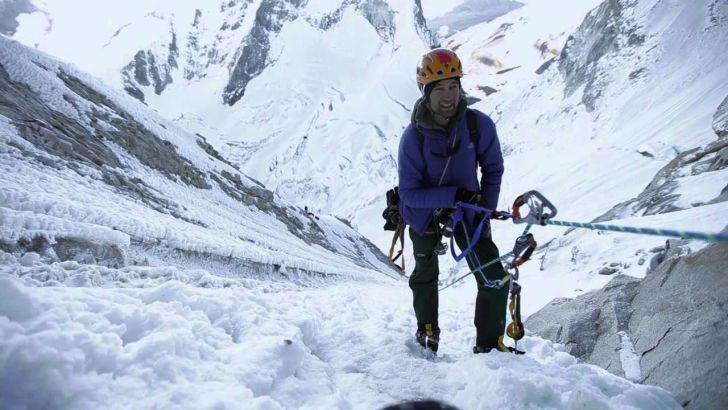Are extreme sports inherently selfish?
Why climb a mountain? "Because it's there," some will say. But is that reasoning good enough?

I’m constantly in awe of rock climbers and alpinists. Partly out of jealously, as I wish to find myself in various far-flung destinations of grandeur and beauty. Partly out of appreciation for the athleticism of it all, when heights and distances reach dizzying figures. But mainly it’s from a covetousness of their fearlessness. I’d defy anyone to view “Free Solo,” about free-climber Alex Honnold’s rope-less climb up Yosemite’s El Capitan, and not feel that sense of awe.
But I’m inherently risk-averse. I feel like I became more so after law school, when random acts of childish fun started playing out in my mind as an opening statement in a lawsuit. It became apparent like never before: There are countless ways to get injured in this world; why invite them on yourself? But the question remains: Are those who are brave enough (and even talented enough) to attempt such feats inherently selfish?
In the March 2, 2020 issue of The New Yorker, Nick Paumgarten dives deep into a secret weapon of sorts for the North Face – a therapist who, despite not being an alpinist, intuitively understands the inherent risks of the sport and how to help climbers cope with all-too-common deaths of their friends and climbing partners.
The cold hard truth of the sport is this: It’s deadly. The story is filled with unbelievable amounts of death, and the community of professional athletes is relatively small. Because the ways in which this therapist so deeply connects with these athletes defies description in many ways, the story reads to me as a philosophical musing: What kind of toll does that take on a person, and what kind of person invites it? Conrad Anker, one of the most famous alpinist in the world, has, by virtue of his longevity, seen unbearable amounts of death. He’s never far from it, as his very family is a constant reminder of it; his wife and adopted sons are the family of one of his dearest friends and climbing partners, Alex Lowe, who died on a trip with Anker. If you want to hear Anker speak on this difficult period in his life, I recommend the incredible documentary Meru (on Amazon Prime).
Obviously, Anker has a lot of baggage, but I can’t help but wonder about his wife. Jennifer Lowe-Anker lost of husband and father of her sons to climbing, and after marrying Anker, she’s confronted with the same potential every time he went out on a large-scale climb. The story mentions this briefly:
She cited a remark she’d heard decades ago that comes up all the time, in reference to mountaineering: “It’s not that different from young men going off to war. Women like me, it’s not new. How many women are there in war-torn areas who have lost their husbands and a raft of sons and family members?”
But Anker knows that’s a bit disingenuous, or at least too generous by half:
“A fundamental difference, and why people are critical of this, is that we do this by our own volition, whereas if you’re a firefighter, a soldier, or a police person, you’re a hero, you did that on behalf of other people in society, or because you had to.”
One of the most poignant lines from the entire story centers on Max Lowe, one of Anker’s adopted sons, who is making a film about his family:
Some people compare climbing to heroin: addictive, selfish, deadly. And yet, while society tends to condemn people who abandon their families for opiates and die of an overdose, we often treat fallen climbers, including Max’s father, as heroes. “It’s a lot to ask someone to give up something they love for you,” Max said. “But if you can’t expect your parents to give that up for you, what can you expect in this life?”
Compounding the question is the role of the North Face and corporate sponsorship of such activities. The article grapples with that as well. But then I carry the corporate sponsorship example to its logical extreme, and when you get right down to it, I’m the targeted end user; I watch the films that are bankrolled by these companies and I buy their gear. Much like a conflicted fan of football might view the CTE revelations: For how much of this am I responsible? Because the poetic flip side of alpine climbing, as described by Paumgarten, greatly appeals to me:
Having been spared war, starvation, mass violence, and oppression, its practitioners travel great distances and endure great sacrifices to test their bodies and minds, encounter beauty, and experience the precariousness of existence and the terror and whatever revelations, fleeting or otherwise, may come of it. Though the whole enterprise may seem crazy or stupid or pointless, to many people it represents a necessary extreme of human endeavor, that combination of excellence and aberrance which propels a sliver of the population to set about going to the moon or writing symphonies, or dropping out entirely, as latter-day hermits and monks.
Read the whole story here:
Survivor’s Guilt in the Mountains | The New Yorker
If you liked what you read, please sign up, follow me on Twitter (@CaryLiljohn06) and then forward to friends to help spread the word.